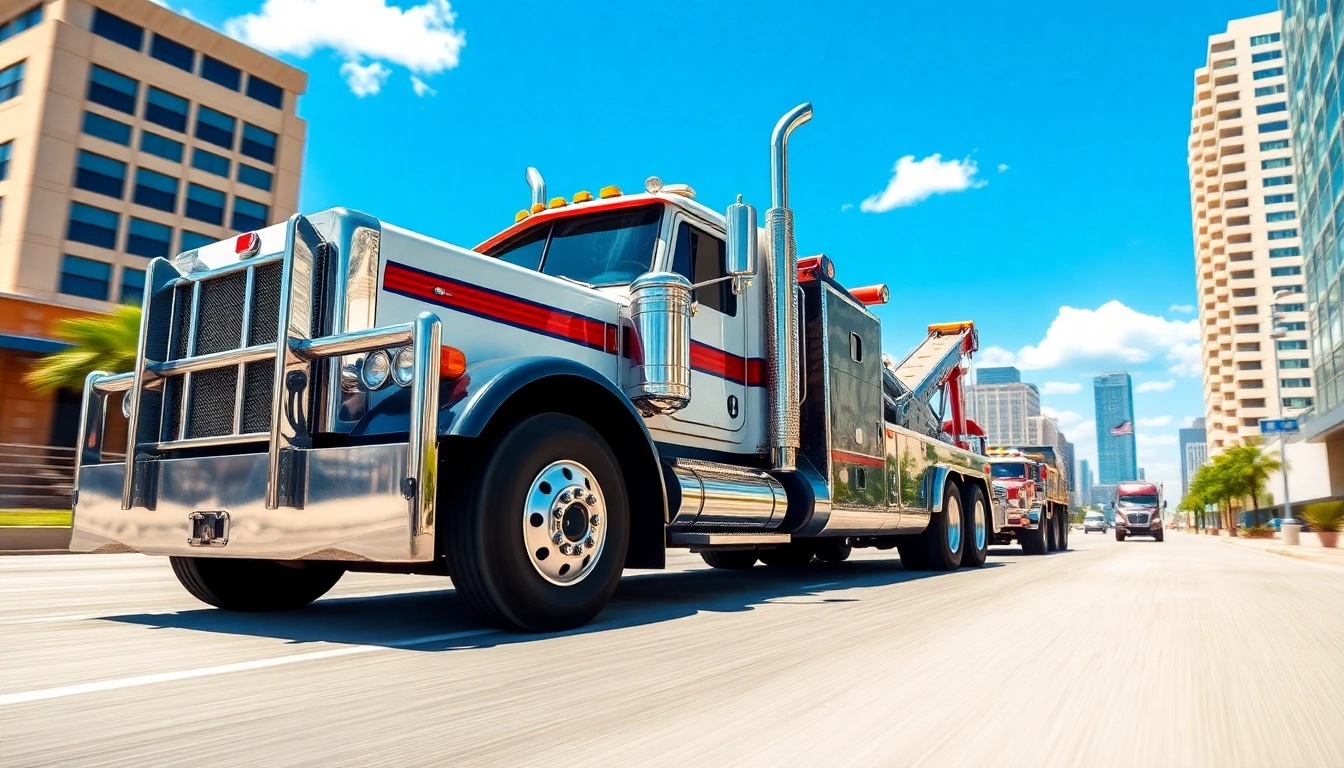1. Understanding Heavy-Duty Towing
a. What is Heavy-Duty Towing?
Heavy-duty towing is specialized vehicle recovery designed to handle oversized or heavily weighted vehicles that standard light-duty tow trucks cannot manage effectively. This type of towing requires robust equipment, well-trained professionals, and often customized techniques to ensure safety and efficiency during the towing process. Vehicles that typically fall under the category of heavy-duty towing include large trucks, buses, motorhomes, and construction equipment. Unlike light-duty towing, which focuses on typical passenger vehicles like cars and vans, heavy-duty towing addresses the nuances of dealing with substantially larger and often more complex vehicles.
b. The Importance of Heavy-Duty Towing in Tampa
Tampa, with its vibrant commercial sector and transport activities, sees a significant number of heavy-duty vehicles traversing its roads daily. These vehicles play critical roles in logistics, construction, and public transportation. Therefore, having reliable heavy-duty towing Tampa services is essential to ensure that any breakdowns or accidents are handled quickly and safely. Quick recovery services minimize downtime for businesses dependent on these heavy vehicles, and professional towing can prevent secondary incidents on the road, improving overall traffic safety.
c. Types of Vehicles Supported
A variety of vehicles require heavy-duty towing services, including but not limited to:
- Tractor-Trailers: These are among the most commonly towed heavy-duty vehicles, often requiring specialized equipment and rigs.
- Buses: Both public and private transit buses necessitate heavy-duty towing solutions, particularly when they experience engineering issues.
- Construction Equipment: Excavators, bulldozers, and other heavy machinery often require transport due to breakdowns or project relocations.
- Recreational Vehicles (RVs): These oversized vehicles benefit from heavy-duty towing, especially during mechanical failures while traveling.
- Large Delivery Vans: Custom trucks used for delivering bulky items or heavy products often require specialized towing equipment.
2. Services Offered in Tampa
a. 24/7 Heavy-Duty Towing and Recovery
A key service provided by heavy-duty towing operations in Tampa is 24/7 availability. Vehicle breakdowns can happen at any time, often in inconvenient locations. A reliable towing service ensures immediate dispatch of help, no matter the hour. This service typically encompasses:
- Emergency Recovery: In cases of accidents or mechanical failures, professional operators use winches, flatbeds, and other specialized tools to safely retrieve damaged vehicles.
- Roadside Repairs: Some towing services also offer limited on-site repairs to get vehicles back operational quickly, reducing repair times substantially.
- Transport to Repair Shops: Towed vehicles are often brought to nearest garages or dealerships, ensuring they receive the correct repairs.
b. Commercial Vehicle Towing Solutions
Commercial vehicles often face unique challenges due to their size and the nature of their load. Towing companies in Tampa provide tailored solutions that include:
- Fleet Support: Managing fleets of heavy-duty vehicles involves a system of consistent maintenance and emergency services. Towing companies collaborate closely with businesses to streamline support processes.
- Load Shifts: On occasion, loads may need to be realigned or transferred to avoid overweight situations on the road, demanding immediate towing assistance.
- Vehicle Hauling: Many companies need long-distance towing of commercial vehicles which requires proper permits and planning.
c. Emergency Roadside Assistance for Heavy Vehicles
Roadside assistance is often a crucial component of heavy-duty towing services in Tampa. It typically includes responding to incidents such as:
- Flat Tires: Heavy vehicles can suffer from tire issues, which need specialized equipment to safely change or repair.
- Fuel Deliveries: In cases where a vehicle runs out of fuel, towing services often provide emergency fuel deliveries as part of their roadside assistance.
- Battery Boosts: Heavy-duty trucks and vehicles can encounter battery failures, and providing a boost is usually within the purview of comprehensive towing services.
3. Choosing the Right Towing Company
a. Factors to Consider When Selecting a Towing Service
Choosing the right towing service, especially for heavy-duty vehicles, involves several essential factors that ensure not just immediate assistance but also long-term value:
- Experience and Expertise: Look for companies with a proven track record in handling heavy-duty towing to ensure they understand the nuances involved.
- Service Area: A towing service should cover a broad area in and around Tampa to provide quick access and reduce wait times.
- Availability: Opt for a company that offers 24/7 services to guarantee that help is accessible any time of the day or night.
b. Customer Reviews and Reputation
Before choosing a towing service, potential users should check customer reviews and the reputation of the company. Consider looking for:
- Online Reviews: Websites like Google, Yelp, and social media platforms often provide candid customer feedback that can be invaluable.
- Accreditations: Look for towing companies that are part of professional associations or accredited by local business bureaus.
- Referrals: Personal recommendations from friends or local businesses can also provide insights into the reliability and quality of service.
c. Pricing and Transparency
Cost is a significant factor when selecting a towing service. Potential clients should consider:
- Quotes: Obtain comprehensive quotes upfront that detail the services and potential additional charges.
- Payment Methods: Ensure the towing company offers flexible payment options that fit your needs.
- Transparency: Choose services that are open about their pricing structure and any potential hidden fees.
4. The Towing Process Explained
a. Initial Call and Dispatch Overview
The towing process begins with the initial contact made by the client to the towing service. Here’s how it typically unfolds:
- Initial Assessment: Upon making a call, the dispatcher will ask several questions to assess the situation, such as the vehicle type, problem, and location.
- Dispatch: Based on the information provided, the dispatcher sends the most suitable tow truck and crew to the scene, ensuring the correct equipment is used for the situation.
b. Equipment and Techniques Used
Heavy-duty towing requires specific equipment and techniques, including:
- Heavy Wreckers: These are specialized tow trucks designed to lift and transport heavier vehicles safely.
- Flatbed Trucks: Used for transporting damaged vehicles, flatbeds allow for easier loading and unloading.
- Winching Gear: This equipment is crucial for heavy-duty recovery operations, particularly in challenging situations like steep slopes or mud.
c. After-Service Care and Follow-up
After the towing service is complete, many reputable companies offer after-service care that can include:
- Follow-Up Calls: Companies often follow up with clients to ensure satisfaction and to address any potential issues.
- Recommendations: After an incident, the towing service may provide clients with information on recommended repair services or tips on vehicle maintenance to avoid future issues.
5. Safety Tips for Heavy-Duty Towing
a. Ensuring Safe Loading and Transport
Proper loading techniques are crucial in heavy-duty towing to prevent accidents during transport, including:
- Distributed Weight: Ensuring the load is evenly distributed across the towing vehicle helps maintain stability while on the road.
- Secure Fastening: All vehicles should be securely fastened to avoid movement during transit’ this can include chains and straps.
- Usage of Proper Tools: Utilizing the right equipment such as wheel dollies, winches, and hydraulic lifts enhances safety during the loading phase.
b. Importance of Well-Maintained Equipment
The upkeep of towing equipment is vital for safety, and this includes:
- Regular Inspections: Tow trucks should undergo frequent checks to ensure all equipment is functioning as expected.
- Maintenance Checks: Regular maintenance prevents equipment failures that could lead to accidents during towing operations.
- Training: Operators should be well-trained not only in the operation of heavy-duty vehicles but also in safety protocols.
c. Compliance with Local Regulations
Heavy-duty towing services in Tampa must adhere to local regulations, including:
- Legal Weight Limits: Towing operations must not exceed prescribed weight limits to ensure safety on roads.
- Permitting: Certain heavy hauling may require permits and compliance with local or state-specific transportation laws.
- Insurance: All towing companies must maintain adequate insurance coverage to protect against accidents and damages during the towing process.



